致用大学英语 口语教程 book3unit11
现代大学英语精读3_unit_11课后答案
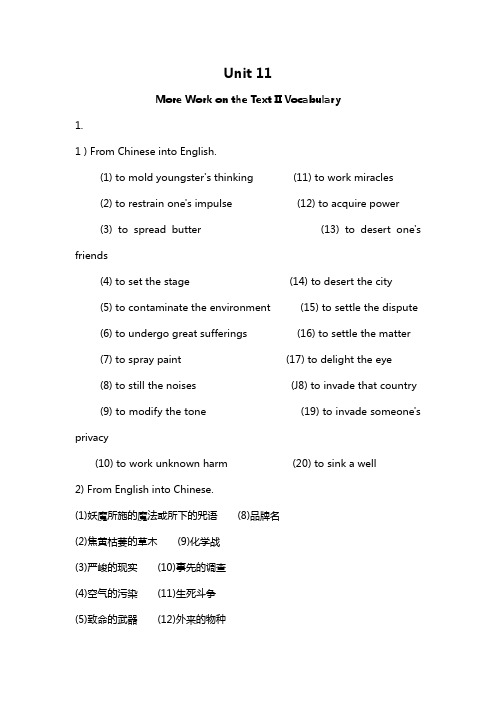
Unit 11More Work on the Text II Vocabulary1.1 ) From Chinese into English.(1) to mold youngster's thinking (11) to work miracles(2) to restrain one's impulse (12) to acquire power(3) to spread butter (13) to desert one's friends(4) to set the stage (14) to desert the city(5) to contaminate the environment (15) to settle the dispute(6) to undergo great sufferings (16) to settle the matter(7) to spray paint (17) to delight the eye(8) to still the noises (J8) to invade that country(9) to modify the tone (19) to invade someone's privacy(10) to work unknown harm (20) to sink a well2) From English into Chinese.(1)妖魔所施的魔法或所下的咒语 (8)品牌名(2)焦黄枯萎的草木 (9)化学战(3)严峻的现实 (10)事先的调查(4)空气的污染 (11)生死斗争(5)致命的武器 (12)外来的物种(6)人工合成的材料 (13)自然保护区(7)有创造力的头脑 (14)农业的精耕细作(1)numerous,innumerable(2)large amount,great supply,plenty,more than enough(3)to shake,to shiver,to shudder(4)big,large,considerable,abundant(5)cruel,pitiless,ruthless,severe,hard(6)to shape,to form,to remodel(7)to change,to transform,to revise,to convert,to modify,to vary(8)to use(9)prepared,adjusted,or adapted for a particular purpose(10)exactly just(11)to experience,to go through,to endure(12)useless,vain,unsuccessful(13) artificial, man-made, unnatural ~(14) to rise, to appear, to surface, to come up, to come into view(15) contamination(16) deadly, fatal(17) attack(18) evil, wicked, threatening, frightening(19) to alter, to change, to adjust, to adapt3.1) Building a house is no joking matter. You have to check carefully atevery step.2) His troops successfully checked the advance of the enemy.3) I really wanted to refute his arguments, but I checked myself becauseI thought it was not the right occasion.4) Are you sure that we can trust him? I think we ought to check it upon him.5) Our original intention was to check into a hotel, but our friendinsisted that we should stay at his p!aee.6) Rachel Carson devoted all her life to the cause of environmentalprotection.7) They are devoted to each other. Nothing can separate them.8) He devoted a whole chapter to this subject in his recently publishedbook'9) This reservoir can hold two billion cubic meters of water.10) At that time, we all held our breath. You could hear a needle drop.11) Diogenes held the view that the property people hold does not reallybi~ing happiness.12) He did not intend his discovery to be used for war purposes.13) These colorful clothes are intended for the African market.14) Today there are so many cars in the streets. I'd rather walk than drive.It's quicker.15) He would rather die standing on his feet than live on his knees.16) You can use my bike , or rather my wife's bike.17) I hear that the movie is intended to be a hit. But I must confess Ithink it is rather silly.4.1) A. 4) D. 7) A. 10) D. 13) A.2) B. 5) C. 8) B. 11) A. 14) D.3) A. 6) B. 9) A. 12) B. 15)C.5.1) a piece of news 2) a piece of information3) a newspaper/paper 20) a jacket4) a slip/piece of paper 21) a suit (of clothes)5) a piece of advice/a proposal (suggestion) 22) a piece of land/aplot6) a song 23) a piece/bar of soap7) a piece of music 24) a piece of furniture8) a stone/a rock 25) a rope9) a piece of wood 26) a hair10) a tree 27) two fish11) a lump of sugar/a piece of candy 28) three sheep12) a piece of evidence 29) a lot of (lots of, much,a great deal of, a13) a loaf of bread large amount of, a largequantity of, large14) a piece/slice of bread quantities of) money15) a job 30) a lot of (lots of, many, agreiit number16) a means of, large numbers of)problems17) a fish 31) some (a little, a bit of)time18) a piece of cloth 32) some (a few, several)deer19) a piece of clothing/a garment (dress, coat)B1) a pair of (shoes, glasses, gloves etc) 9) a blade of (grass)2) a drop of (water, wine' oil etc) 10) a flock of (birds,sheep)3) a set of (teacups, books etc) 11) a pile of (books, stones,melons)4) a bunch of (keys, bananas, people .etc) 12) a roll of (film, toiletpaper)5) a glass of (beer, wine, milk etc) 13) a swarm of (bees, flies)6) a cup of (tea, coffee etc) 14) a heap of (stones,money)7) a pack of (cigarettes, wolves etc) 15) a cluster of (flowers,students)8) a grain of (rice, salt, sand etc) 16) a herd of (cattle)6.1) (1) exchange (2) changed (3) exchanged, changed(4) an exchange, an exchange2) (1) except (2) Besides (3) beside (4) except3) (1) used to, is used to (2) am used to (3) used to4) (1) shaking (2) shivering (3) trembled/shook (4)trembled7.1)你上月的电话费(bill账单)付了吗?2)那个法案(bill法案)在国会里被否决了。
大学英语综合教程3 Unit 11

• Not so much…as…
• One description of sth is less correct than another ▫ She was not so much nervous as impatient for the journey to be over. ▫ It’s not so much a hobby as a career(=more like a career than a hobby)
•Badger 不断督促; 纠缠
• Try to persuade sb. ① My friends keep badgering me to get a cell phone. ② I had to badger the kids into doing their homework.
Comprehension
Unit 11
On Becoming a Better Student
• Put
• To say or write sth using words in a particular way ▫ It is hard to put into words how I feel now. ▫ It’s fairly risky. Or to put it another way, don’t try this at home.
•Cumulative
• Increasing gradually ; accumulation ① Learning is a cumulative process. ② Depression is often caused by the cumulative effects of stress. ③ The cumulative effect of human activity on the world environment
unit11 英语泛读教程第三册
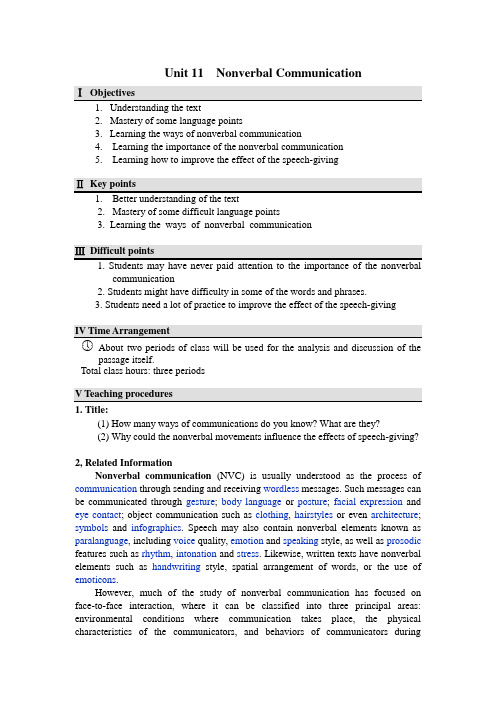
Unit 11 Nonverbal CommunicationⅠObjectives1.Understanding the text2.Mastery of some language points3. Learning the ways of nonverbal communication4. Learning the importance of the nonverbal communication5. Learning how to improve the effect of the speech-giving2. Mastery of some difficult language points3. Learning the ways of nonverbal communicationcommunication2. Students might have difficulty in some of the words and phrases.3.Students need a lot of practice to improve the effect of the speech-givingAbout two periods of class will be used for the analysis and discussion of the passage itself.Total class hours: three periods1. Title:(1) How many ways of communications do you know? What are they?(2)Why could the nonverbal movements influence the effects of speech-giving? 2, Related InformationNonverbal communication(NVC) is usually understood as the process of communication through sending and receiving wordless messages. Such messages can be communicated through gesture; body language or posture; facial expression and eye contact; object communication such as clothing, hairstyles or even architecture; symbols and infographics. Speech may also contain nonverbal elements known as paralanguage, including voice quality, emotion and speaking style, as well as prosodic features such as rhythm, intonation and stress. Likewise, written texts have nonverbal elements such as handwriting style, spatial arrangement of words, or the use of emoticons.However, much of the study of nonverbal communication has focused on face-to-face interaction, where it can be classified into three principal areas: environmental conditions where communication takes place, the physical characteristics of the communicators, and behaviors of communicators duringinteractionVerbal vs oral communicationScholars in this field usually use a strict sense of the term "verbal", meaning "of or concerned with words," and do not use "verbal communication" as a synonym for oral or spoken communication. Thus, vocal sounds that are not considered to be words, such as a grunt, or singing a wordless note, are nonverbal. Sign languages and writing are generally understood as forms of verbal communication, as both make use of words — although like speech, both may contain paralinguistic elements and often occur alongside nonverbal messages. Nonverbal communication can occur through any sensory channel—sight, sound, smell, touch or taste. NVC is important as: "When we speak (or listen), our attention is focused on words rather than body language. But our judgement includes both. An audience is simultaneously processing both verbal and nonverbal cues. Body movements are not usually positive or negative in and of themselves; rather, the situation and the message will determine the appraisal."3. Text analysisPara1-4 By giving an example about different effects created by nonverbal actions, the author points out the importance of the proper nonverbal actions.Para5-21 The major aspects of nonverbal communication that will affect the outcome of the speech-giving.4. Key words and expressions(1) stricken(2) nonverbal communication(3) posture(4) facial expression(5) gesture(6) eye contact(7) plod(8) bizarre(9) attire (10) novice(11) demeanor(12) adroit(13) spontaneous(14) upstage(15) gauge(16) disconcerting(17) blank(18)manipulate5. Topic for Discussion(1) Why is nonverbal communication important to a public speaker?(2) What are the four aspects of nonverbal communication you shouldconcentrate on in your speeches?6.Exercises about the text7. Reading skills: Reading Instructions8. Fast Reading & ExercisesVI Homework.1. Home reading: Your Actions Speak Louder2.Preview Unit 14。
大学英语专业综合教程第三册Unit11课文及单词
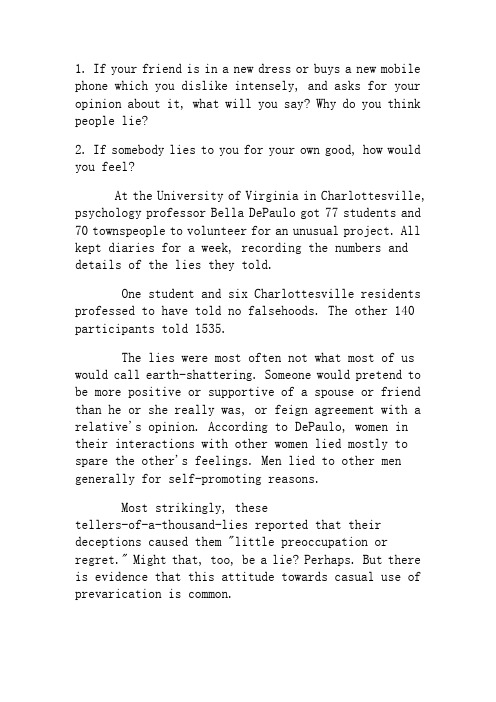
1. If your friend is in a new dress or buys a new mobile phone which you dislike intensely, and asks for your opinion about it, what will you say? Why do you think people lie?2. If somebody lies to you for your own good, how would you feel?At the University of Virginia in Charlottesville, psychology professor Bella DePaulo got 77 students and 70 townspeople to volunteer for an unusual project. All kept diaries for a week, recording the numbers and details of the lies they told.One student and six Charlottesville residents professed to have told no falsehoods. The other 140 participants told 1535.The lies were most often not what most of us would call earth-shattering. Someone would pretend to be more positive or supportive of a spouse or friend than he or she really was, or feign agreement with a relative's opinion. According to DePaulo, women in their interactions with other women lied mostly to spare the other's feelings. Men lied to other men generally for self-promoting reasons.Most strikingly, these tellers-of-a-thousand-lies reported that their deceptions caused them "little preoccupation or regret." Might that, too, be a lie? Perhaps. But there is evidence that this attitude towards casual use of prevarication is common.For example, 20,000 middle-and high-schoolers were surveyed by the Josephson Institute of Ethics — anonprofit organization in Marina del Rey, California, devoted to character education. Ninety-two per cent of the teenagers admitted having lied to their parents in the previous year, and 73 per cent characterized themselves as "serial liars," meaning they told lies weekly. Despite these admissions, 91 per cent of all respondents said they were "satisfied with my own ethics and character."Think how often we hear the expressions "I'll call you" or "The check is in the mail" or "I'm sorry, but he stepped out." And then there are professions —lawyers, pundits, public relations consultants —whose members seem to specialize in shaping or spinning the truth to suit clients' needs.Little white lies have become ubiquitous, and the reasons we give each other for telling fibs are familiar. Consider, for example, a corporate executive whom I'll call Tom. He goes with his wife and son to his mother-in-law's home for a holiday dinner every year. Tom dislikes her "special" pumpkin pie intensely. Invariably he tells her how wonderful it is, to avoid hurting her feelings."What's wrong with that?" Tom asked Michael Josephson, president of the Josephson Institute. It's a question we might all ask.Josephson replied by asking Tom to consider the lie from his mother-in-law's point of view. Suppose that one day Tom's child blurts out the truth, and she discovers the deceit. Will she tell her son-in-law, "Thank you for caring so much"? Or is she more likelyto feel hurt and say, "How could you have misled me all these years? And what else have you lied to me about?"And what might Tom's mother-in-law now suspect about her own daughter? And will Tom's boy lie to his parents and yet be satisfied with his own character?How often do we compliment people on how well they look, or express our appreciation for gifts, when we don't really mean it? Surely, these "nice lies" are harmless and well-intended, a necessary social lubricant. But, like Tom, we should remember the words of English novelist Sir Walter Scott, who wrote, "What a tangled web we weave, when first we practice to deceive."Even seemingly harmless falsehoods can have unforeseen consequences. Philosopher Sissela Bok warns us that they can put us on a slippery slope. "After the first lies, others can come more easily," she wrote in her book Lying: Moral Choice in Public and Private Life. "Psychological barriers wear down; the ability to make more distinctions can coarsen; the liar's perception of his chances of being caught may warp."Take the pumpkin-pie lies. In the first place, it wasn't just that he wanted his mother-in-law to feel good. Whether he realized it or not, he really wanted her to think highly of him. And after the initial deceit he needed to tell more lies to cover up the first one.Who believes it anymore when they're told that the person they want to reach by phone is "in a meeting"? By itself, that kind of lie is of no great consequence.Still, the endless proliferation of these little prevarications does matter.Once they've become common enough, even the small untruths that are not meant to hurt encourage a certain cynicism and loss of trust. "When [trust] is damaged," warns Bok, "the community as a whole suffers; and when it is destroyed, societies falter and collapse."Are all white lies to be avoided at all costs? Not necessarily. The most understandable and forgivable lies are an exchange of what ethicists refer to as the principle of trust for the principle of caring, "like telling children about the tooth fairy, or deceiving someone to set them up for a surprise party," Josephson says. "Still, we must ask ourselves if we are willing to give our friends and associates the authority to lie to us whenever they think it is for our own good."Josephson suggests a simple test. If someone you lie to finds out the truth, will he thank you for caring? Or will he feel his long-term trust in you has been undermined?And if you're not sure, Mark Twain has given us a good rule of thumb. "When in doubt, tell the truth. It will confound your enemies and astound your friends."New words:volunteerv. to give or offer (one's help, a suggestion, etc.) willingly or without being paidprofessv. to make a claimfeignv. to pretend to have or bepreoccupationn. the state of constantly thinking or worrying about somethingprevaricationn. the state of avoiding giving a direct answer or making a firm decisionseriala. of, in or forming a number of things, events, etc. of a similar kind, especially placed or occurring one after anotherethicsn. moral correctness; moral principlespunditn. a person who is an authority on a particular subject; an expertconsultantn. a person who gives specialist professional advice to othersfibn. a small unimportant liedeceitn. dishonest act or statementlubricantn. a substance such as oil which cause a machine to operate more easilytanglev. to make or become a mass of disordered and twisted threadswear downto reduce or become weaker until uselessperceptionn. the ability to see, hear and understand; the quality of understandingwarpv. to (cause to) turn or twist out of shapeproliferationn. a rapid increase in the amount or number of somethingcynicismn. the belief that people always act selfishlyfalterv. to lose power or strength in an uneven way, thus no longer making much progressassociaten. a person who is connected to another person as a businesspartner, colleague, or companionunderminev. to gradually make somebody or something less strong or effectiveconfoundv. to confuse and greatly surprise people, causing them to be unable to explain or deal with a situationastoundv. to make somebody very surprised or shocked, especially with (news of) something completely unexpected。
新编英语教程第三册Unit11
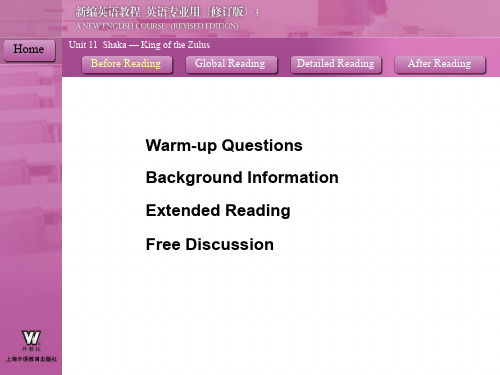
Home
Unit 11 Shaka — King of the Zulus
Before Reading
Global Reading
Detailed Reading
After Reading
Warm-up Questions
1. What kind of king was Shaka? He was most probably a cruel king.
Home
Unit 11 Shaka — King of the Zulus
Before Reading
Global Reading
Detailed Reading
After Reading
Extended Reading
Directions: Listen to the following information for a better understanding of the Zulu life. While listening, please fill in the blanks with the information you hear.
Descendants of the Nguni peoples of southeast Africa, the Zulu trace their history back to the 14th and 15th centuries when they _m_i_g_r_at_e_d_ southward and settled into modern-day South Africa. During the 1800s, under Chief Shaka, the Zulus _es_t_a_b_li_s_h_ed_ themselves as a very powerful people and were feared throughout southern Africa. During this time it was the men who wove Zulu baskets; however, as the British took the men to work in the mines, women found it necessary to learn to weave the traditional African Zulu Baskets. Zulu baskets served as functional utilitarian containers and were typically devoid of any designs or patterns.
现代大学英语精读3第二版Unit11_Book3

Why do historians disagree? Tick the reasons.
A. They get wrong facts. B. They select and use different historical facts. C. They differ on the importance of the same facts. D. They consider different levels of cause and effect. E. They view the event from different perspectives and analyze it in different theoretical frames. F. They are often revising their ideas.
Background
Views on History
B. The French Annal School A radical shift of perspective in the study of history from the SIGNIFICANT events—political, economic, personal—to the DAILY and ROUTINE happenings in the life of the common people. A shift of focus from the court and battlefield to the folk and tea table of the common.
Text Analysis
Detailed Analysis
Part I (A): Words & Expressions
全新版大学英语第三册UNIT11

(to do or have sth that is not what you really wanted, but it’s still satisfactory)
Unit 1
Changes in the Way We Live
Preparations
❖ 1.what do you think of the title? Why people want to change their ways they live?
❖ 2.what are your life style?
2)due to: because of
eg: The company’s problems are due to a mixture of bad luck and poor management.
3)in due course: at some time in the future when it is the right time, but not before
eg: 委员会会在适当的时候考虑你的申请的.
❖ 5. Improvement: an act of improving or a state of being improved
eg: We need to carry out some improvements to the computer system. ★cf: improve(ment) on / improve(ment) in
新编英语教程第三册Unit11

Unit 11TEXT IShaka — King of the ZulusTextShaka's military career started at about the same time as Napoleon's came to an end at Waterloo. Neither man had ever heard of the other, yet they had a surprising amount in common, particularly in their genius for war and politics. Had Shaka been born in Europe he too might well have altered the course of world affairs. As it was, he built the Zulu nation. And he would have destroyed it had it not been for the courage of a minor chieftain, Gala.When he was still only twenty-nine, Shaka seized the throne of the Zulus. It took him very little time to turn the Zulu people into a first-class fighting race because he was absolutely ruthless, never moving without an escort of "slayers", whose job it was to kill anyone who displeased him in any way. If his warriors could not run 50 miles a day, they died; if they were unable to dance barefoot on a carpet of jungle thorns, they died; if they showed anything less than suicidal courage in battle, they would be unhesitatingly murdered by the slayers. Shaka was inhuman, perhaps, but he built up a formidable army in a very short time. Shaka had already increased his kingdom from 100 square miles to 100,000 when personal tragedy struck: his mother, Nandi, died. Nandi was the one person for whom Shaka felt deep affection, and on her death something seemed to snap in his mind. What followed was unbelievable, but it was recorded by an Englishman named Flynn who was in the area at the time. Nandi was buried, and 12,000 warriors were ordered to guard her grave for a year. Then Shaka sent his impis or regiments to scour the countryside and punish all those who had failed to be present at the funeral. Only after this had been done did he announce his orders for mourning: no crops were to be planted the following year; no milk was to be used — it was to be drawn from the cow and poured on to the earth and all women who were found with child during the following year were to be put to death with their husbands. As the staple diet of the Zulus consisted of grain and milk products, this order was little less than a sentence of national starvation.Shaka now developed a brooding and bitter spirit: "I have conquered the world but lost my mother," he would cry, "and all taste has gone out of my life."After two months of intensive mourning over Nandi's death, the country was in a desperate state. The fields were overgrown with weeds and oneof the staple diets, namely milk, was no longer on the food list. Total ruin now faced the Zulu nation, and it was obvious that those who had not been killed by Shaka would certainly starve to death.Finally, one of Shaka's warriors, Gala, determined to end the tyranny. "It is enough," he told his family. "Someone must tell the Great Elephant.I shall do it. " Gala's family stared at him in horror: to challenge the King's wishes at such a moment was to ask for instant death. But Gala took his warrior's stick and went to Bulawayo to see Shaka. When he reached the right distance from the royal enclosure he shouted: "O King, you have destroyed your country. What will you reign over? Will you create a new race? Shall we all die because your mother died? You have destroyed the country. Your country will be inhabited by other kings, for your people will die of hunger. As for me, O King, I say you are dead yourself through this mother of yours. Stuff a stone into your stomach. This is not the first time anyone has died in Zululand!"Stuff a stone into your stomach! This was the Zulu way of saying: "pull yourself together". There was a gasp of horror from the onlookers, and the slayers took a grip on their clubs. That a man should dare to speak to the King in such a way was unthinkable, and Gala's life seemed to be measured in seconds. But Shaka turned to his Councillors and said: "What use are you to me? You never dared, like Gala, to tell me to stuff a stone in my stomach. Now let all men know that crops are to be planted as usual and that milk may be drunk again. And as for you," said Shaka, turning to Gala, "you shall have a mighty gift of many cattle."From an article in Look and LearnTEXT IIThe Stamping of the ThornsShaka's particular genius lay in his great personal attention to detail and in his capacity for hard work. If at all possible, he always insisted on inspecting everything himself, and he invariably checked all reports by getting evidence from as many sources as possible. He was a firm believer in the saying: "It is the master's eye which makes the cow grow fat."Two months after becoming king, Shaka called all his "regiments" together. His combined fighting forces totalled only about 500 men. He told them of the virtues of the short, heavy stabbing spear or assegai which he himself had designed to replace the light throwing one used in the past by the Zulu fighters. As he expected, the younger soldiers took up the new assegai with enthusiasm, soon to be followed by the older men. Next Shaka ordered all his regiments to throw away their sandals. There was considerable protest at this, especially from the older groups, buthe pointed to his own bare feet and even ran a race to prove that he was faster than any of his men wearing sandals.A month later, Shaka noticed that there was still a lot of dissatisfaction and grumbling about his order that sandals should no longer be worn. So, he told one of his regiments to collect many basketfuls of the sharp "devil thorns". These thorns have three spikes, one of which always points upwards when they lie on the ground.When enough of these thorns had been collected, Shaka ordered them to be spread over the parade ground. All his regiments were then ordered to parade a little to the side of the ground covered with thorns. Shaka then addressed them: "It has come to my ears," he said, "that some of you have soft feet, and this has made me very sad. So I have decided to help you harden them!"Shaka then ordered his men to stamp the thorns into the ground with their bare feet. Anyone who hesitated or did not stamp hard enough was to be killed at once by his "slayers".The regiments gritted their teeth and, led by Shaka himself, spread over the parade ground. Shaka turned to face them and the stamping began. Shaka's feet, however, were horny and impervious. He felt nothing; but his eagle eye at once picked out those who were hesitant. These men were told to stand forward and were then clubbed to death by the slayers. And so he went on, searching up and down the lines, but after half a dozen examples had been made all the soldiers stamped as hard as they could. When Shaka was satisfied that the thorns had been stamped out of sight he told his men they could go. That evening they were given a great feast at which they could eat and drink as much as they liked.From Shaka Zulu by E. A. Ritter。
现代大学英语精读3lesson11SilentSpring(可编辑)

Unit 11 Silent Spring Saving Nature NotOnly for Men Translate the following into English 1 塑造年轻人的心灵2 涂上黄油3 污染环境4 克制冲动5 喷上油漆6 缓和口气7 造成未曾料到的伤害8 赏心悦目9 解决这一争端10 挖一口井 1 evil spell 2 browned and withered vegetation 3 harshreality 4 air contamination 5 lethal weapon 6 synthetic materials 7advance investigation 8 a life-and-death struggle 9 introduced species 10 natural reserves 11 intensification of agricultureJulia Roberts In the drama Erin Brockovich 2000 Roberts plays adivorced mother The role earned Roberts the Golden Globe Award for bestdramatic actress and the Academy Award for best actress monitoring well监控井 hexavalent[化]有六价的 chromium n铬 toxicologist n毒物学者 PGEname of a company 1 Does the woman think that the water is poisonousWhy or why not ---No the woman doesnt think that the water is poisonousbecause the guys from PGE told her that the water was fine and the doctorpaid by PGE also told her the same 2 Do you think that PG E deliberatelycheat these people ---Yes 3 What do you think should the woman and herfamily do if theres really something poisonous in their water ---Theyshould bring a suit against the PGE companyEnvironmentalprotection organizations Green Party a Britishpolitical party that aims to protect the environment It is against the use of nuclear power and other forms of industry and transport which it considers harmful It was formed in 1973 as the Ecology Party and changed its name to the Green Party in 1985 Other countries also have parties that share the same name and ideals Green Rally Green parties which focus on environmental concerns as well as social change emerged as a political force in Europe in the 1980s Shown here supporters of the green political movement demonstrate in Paris Greenpeace A large international pressure group that aims to protect the environment Its members are well known for taking direct action and putting their own lives in danger in order to stop people from harming the environment For example they often go out in small boats to stop people from killing whales or throwing poisonous materials into the sea Greenpeace Flagship Rainbow Warrior This photo shows Greenpeaces flagship Rainbow Warrior which was launched in 1989 on the fourth anniversary of the sinking of its namesake The original Rainbow Warrior was sunk in a New Zealand port by French agents to prevent Greenpeace protests against nuclear tests in the South Pacific The ship was named after the warriors of the rainbow who according to a Native American prophecy were predicted to save the earth from ecological disaster The Environmental Protection Agency A US government organization that established rules and standards for the protection of the environment eg against pollution Gaiahypothesis The theoryput forward by British scientist James ELovelock in the early 1970s that the earth is a single living organismGaia was the ancient Greeks earth goddess Lovelock suggests that the earthis self-regulating like the human body Gaia theory worships the earth tothe point of excess Protagoras c481–411 BC Greek philosopher one ofthe most renowned Sophists professional teacher in Greece in the 5thcentury BC now known mainly for his saying that Man is the measure ofall things The retention of heat by the lower layers of the Earthsatmosphere which it is believed will cause a rise in temperature of theEarth and its atmosphere known as global warming Divisions of theAtmosphere 热层 Thermosphere 中间层 Mesosphere 臭氧层 Ozone Layer平流层 Stratosphere 对流层 Troposphere Without our atmosphere therewould be no life on Earth A relatively thin envelope the atmosphereconsists of layers of gases that support life and provide protection fromharmful radiation Chinas Air Pollution A report released in 2004 by the。
全新版大学英语(第二版)听说教程3电子教案unit11

Unit 11 Left-handedness
Pre-listening Task Language Focus
Left-handed people find it difficult to use scissors / handle trouser zips because all of them are designed for right-handed people. Left-handed people are often baffled by tools that are designed for right-handed people. According to scientific studies left-handed people can be good at sports / solving problems. Quite a few left-handed people seem to do well in creative professions, such as music, art and writing / make good inventors, artists, and authors.
UNIT 11
Left-handedness
Unit 11 Left-handedness
Pre-listening Task Language Focus
Questions for Discussion
1. What does being left-handed mean? 2. Do you have any friends who are left-handed? Do you find them special in any way? 3. How did people in the past view those who were left-handed? Do you think it was unfair? 4. What things do left-handed people find difficult to do in a largely right-handed world? 5. Do you think left-handed people are more intelligent than right-handed people? Why or why not? 6. Do you know any famous people who are left-handed? Name some of them.
综合英语教程第三册11单元3-11-Part 1

Reference Answers
1. Why won’t Jane work in China after she finishes her study? She has been unable to find a job that suits her. As she is studying Chinese medicine, she thinks that it may perhaps be easier for her to open a Chinese clinic in the United States. 2. How does Jane feel about the future of China? She thinks that China is developing very rapidly and that China's modernization will become a reality very soon.
Book 3-Unit 11
Mr. Wang is a friend of Jane. He is pessimistic somewhat ___________ and _________ about uncertain his future. He is a person who lives _____________. To him, ______ doesn’t mean in the present future vague too much. It’s ______.
Book 3-Unit 11
Pre-listening questions: What’s your plan for your future? Discuss the meaning of the following terms: reckon: think, suppose Chinese medicine: traditional method of treating Chinese herbs:中草药 update: to make more modern
大学英语精读第三版第三册Book3Unit1~Unit10翻译答案
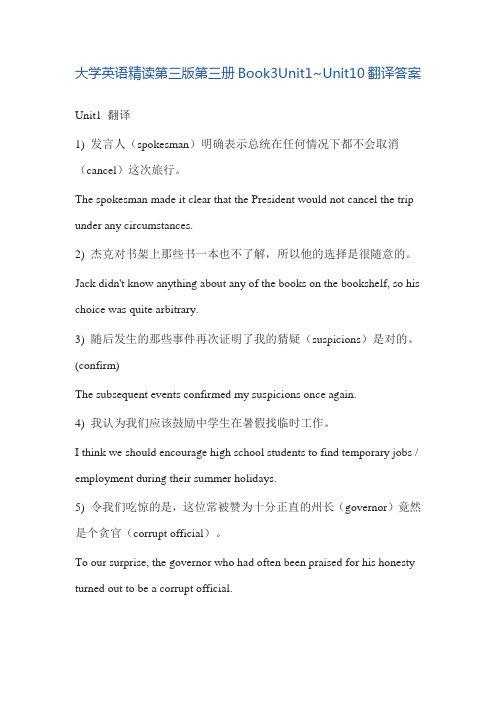
大学英语精读第三版第三册Book3Unit1~Unit10翻译答案Unit1 翻译1) 发言人(spokesman)明确表示总统在任何情况下都不会取消(cancel)这次旅行。
The spokesman made it clear that the President would not cancel the trip under any circumstances.2) 杰克对书架上那些书一本也不了解,所以他的选择是很随意的。
Jack didn't know anything about any of the books on the bookshelf, so his choice was quite arbitrary.3) 随后发生的那些事件再次证明了我的猜疑(suspicions)是对的。
(confirm)The subsequent events confirmed my suspicions once again.4) 我认为我们应该鼓励中学生在暑假找临时工作。
I think we should encourage high school students to find temporary jobs / employment during their summer holidays.5) 令我们吃惊的是,这位常被赞为十分正直的州长(governor)竟然是个贪官(corrupt official)。
To our surprise, the governor who had often been praised for his honesty turned out to be a corrupt official.6) 少数工人得到提升(be promoted),与此同时却有数百名工人被解雇。
A few workers were promoted, but meanwhile hundreds of workers were dismissed.7) 如果有机会,约翰也许已成为一位杰出的画家了。
现代大学英语精读3第二版Unit11_Book3

Why Historians Disagree
Unit 11
Structure
Text Analysis
Detailed Analysis
Text Analysis
Structure
Part I The introduction (paras. 1-5 ) A. Misconceptions about the study of history (paras. 1-3) B. Definition of history (paras. 4-5) Part II The body (paras. 6-11) A. Selection of different facts about the same event (para. 6) B. Use of the same facts from different premises (paras. 7-10) C. Analysis of different levels of cause and effect (para. 11) Part III The conclusion: inevitability of disagreement (paras. 12-13)
Background
Views on History
A. New Historicism It’s a reaction to deconstructionist view of history which amounts to historical nihilism. Yet it’s radically different from traditional historicism. History is not a series of events that have a linear, causal relationship. The self-claimed objective analysis is impossible. Traditional historians ask, ―What happened?‖ and ―What does the event tell us about history?‖ New historicists ask, ―How has the event been interpreted?‖ and ―What do the interpretations tell us about the interpreters?‖
全新版 大学英语 听说教程 第三册 听力原文Tapescripts of Unit 11
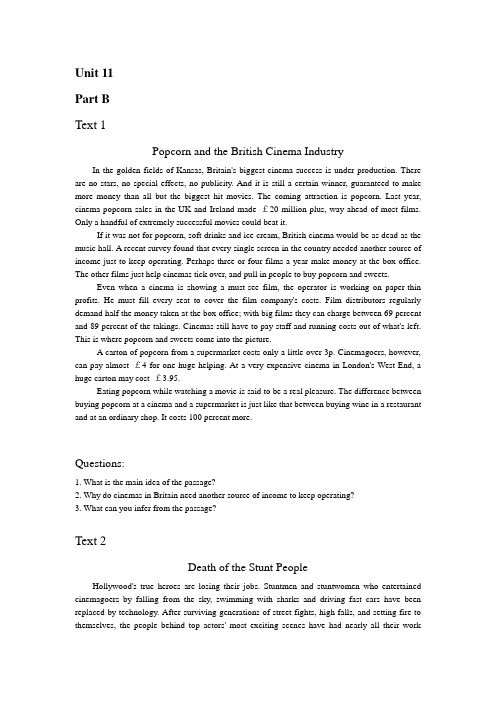
Unit 11Part BText 1Popcorn and the British Cinema IndustryIn the golden fields of Kansas, Britain's biggest cinema success is under production. There are no stars, no special effects, no publicity. And it is still a certain winner, guaranteed to make more money than all but the biggest hit movies. The coming attraction is popcorn. Last year, cinema popcorn sales in the UK and Ireland made £20 million plus, way ahead of most films. Only a handful of extremely successful movies could beat it.If it was not for popcorn, soft drinks and ice cream, British cinema would be as dead as the music hall. A recent survey found that every single screen in the country needed another source of income just to keep operating. Perhaps three or four films a year make money at the box office. The other films just help cinemas tick over, and pull in people to buy popcorn and sweets.Even when a cinema is showing a must-see film, the operator is working on paper-thin profits. He must fill every seat to cover the film company's costs. Film distributors regularly demand half the money taken at the box office; with big films they can charge between 69 percent and 89 percent of the takings. Cinemas still have to pay staff and running costs out of what's left. This is where popcorn and sweets come into the picture.A carton of popcorn from a supermarket costs only a little over 3p. Cinemagoers, however, can pay almost £4 for one huge helping. At a very expensive cinema in London's West End, a huge carton may cost £3.95.Eating popcorn while watching a movie is said to be a real pleasure. The difference between buying popcorn at a cinema and a supermarket is just like that between buying wine in a restaurant and at an ordinary shop. It costs 100 percent more.Questions:1. What is the main idea of the passage?2. Why do cinemas in Britain need another source of income to keep operating?3. What can you infer from the passage?Text 2Death of the Stunt PeopleHollywood's true heroes are losing their jobs. Stuntmen and stuntwomen who entertained cinemagoers by falling from the sky, swimming with sharks and driving fast cars have been replaced by technology. After surviving generations of street fights, high falls, and setting fire to themselves, the people behind top actors' most exciting scenes have had nearly all their worksubstituted by computers. The most dangerous and costly stunts can now be achieved by mixing computer graphics with live action.In the mid-1990s there were 12,000 registered stunt people, but more than half of them had difficulty finding work. Sometimes, six or seven teams would be working on a film. Then, after a few days, the producers would come in and say, 'You can go home.'The reason was simple: cost. Computer technology made it possible to create stunts which would either be too expensive or too dangerous to attempt. One example was in 'Mission Impossible', starring Tom Cruise. In a scene Cruise was seen flying for 35 meters through the air from an exploding helicopter onto the back of a speeding train in the tunnel. In fact, the image of the actor was simply added onto the scene using computers.A fall from 50 meters into water can now be achieved for a tenth of the cost. With the rise of digital technology, insurance companies became more reluctant to cover real stunts. 'If they know it can be done safely with visual effects, the companies will not insure real stunts,' said a veteran stunt coordinator.Many in the industry believe stunt people should develop expertise in the new technology, acting as advisers on the virtual stunts. Some, however, think that stunt people can survive in their traditional careers. They believe that audiences won't accept stunts produced by computers for too long.Questions:1. Which of the statements below best sums up the main idea of the passage?2. What is the author's attitude toward stunt people?3. What can you infer from the passage?Part CDialogue 1A: Betty, would you like to see a movie tonight?B: That would be nice!A: What would you like to see?B: Anything but a thriller.A: How about Star Wars Episode II ?B: That's OK, but I'd prefer seeing a comedy.A: Then let's go to see Spider Man.B: That sounds good.A: OK, Let's go!B: Wait a minute, Adam. Let me get a coat.Questions:1. What will the two speakers probably do tonight?2. What mood is the man probably in?Dialogue 2A: What are we going to do tonight, Barbara?B: What about seeing a film at that new cinema in the mall?A: I don't feel like going to the cinema. I prefer watching TV.B: There is really nothing to watch.A: We can watch videos we've bought but never seen.B: Then, I think it's better to borrow some from my brother.A: What's the difference?B: There are a lot more choices in his videotape case.A: But we can pick up the most interesting one we have. Then, we don't have to make a trip to your brother's.B: Come on, Arthur. I know you are just too lazy to get up from the couch.Questions:1. What film are the two speakers going to see?2. What kind of film does the woman dislike?Dialogue 3A: What kind of movie do you like best, Carol?B: Comedy is my favorite. But I like drama and romance too.A: Don't you like suspense and horror?B: Suspense is OK with me, but certainly not horror.A: I don't fancy horror either. But suspense stories are exciting.B: Yeah, they are really good, especially the ones directed by Hitchcock.A: They are terrific.B: What type of movie do you like best, Alan?A: As a matter of fact, I like action and adventure best.B: I like them as well.A: Have you seen Mission Impossible, starring Tom Cruise?B: No. He's certainly popular.A: Shall we go and see it?B: Why not?Questions:1. What types of film appeal to both the speakers?Part DFrom Rags to RichesIn the 1990s, Demi Moore was a major movie star and, as the wife of Bruce Wilis, one half of a Hollywood power couple. Life was good. She had a multimillion-dollar mansion in Los Angeles, a 25-acre ranch in Hailey, Idaho. Nothing about that glamorous life had anything in common with her poor childhood.She grew up in New Mexico. Her parents were hard drinkers who moved her and her half-brother 30 times before settling in Los Angeles when she was 14. Fiercely ambitious, Moore began modeling while at high school and dropped out at 16 to pursue an acting career. Soon after she turned 18, she got a part in a popular soap opera. But her big break came in 1985 when she starred as a drug addict in a hit movie.Moore met Bruce Wilis in 1987. It was love at first sight. They got married in Las Vegas four months later. The next year, Wilis starred in Die Hard, making him one of Hollywood's top-paid actors, while Moore's success in Ghost and A Few Good Men boosted her paycheck to more than $12 million per movie.These were followed by three big-budget movies, one of which was The Scarlet Letter. Then her career stalled. And in October 2000, her 13-year-old marriage ended in divorce. Later she moved out of Hollywood. Since then, she has been living a simpler life, residing full time in her ranch in Idaho. Her ambition is now focused not on stardom but on being a good mother to her daughters with Wilis. "My goal is to build a loving relationship so that my children, as adults, will want to share their lives with me," she said.Questions:1. How does the writer tell us about the huge difference between Demi Moore's rich life as a movie star and her poor childhood?2. Which of the following had not been done by Demi Moore before her first major achievement in her movie career?3. According to the passage, why did Demi Moore and Bruce Wilis marry?4. Why did Moore's marriage end up in divorce?5. What kind of life is Moore living now according to the passage?重点单词及词组Part Bpublicity 公开guarantee 保证a handful of 一把cinemagoer 电影迷substituted 取代的computer graphics 电脑图形图象helicopter 直升机digital 数字的reluctant 不情愿的,勉强的Part Cthriller 惊悚片suspense 焦虑,悬念Part Dmansion 公寓glamorous 迷人的in common with 和…一样fiercely 猛烈地stardom 演员们drug addict 吸毒成瘾者。
大学体验英语 快速阅读教程3 Unit 11 Technology
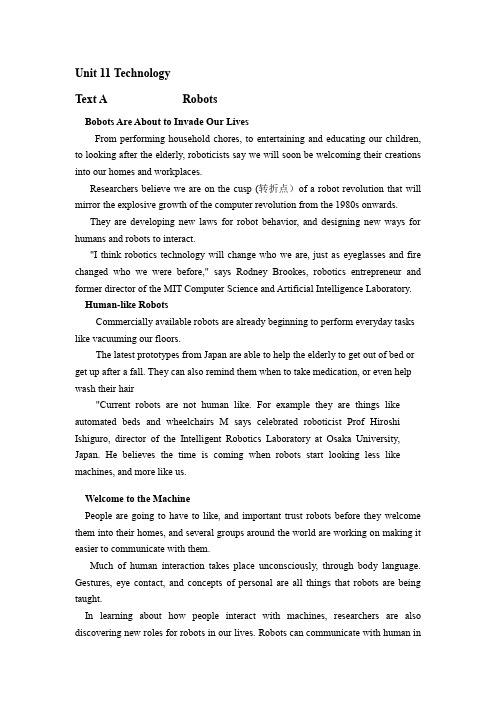
Unit 11 TechnologyText A RobotsBobots Are About to Invade Our LivesFrom performing household chores, to entertaining and educating our children, to looking after the elderly, roboticists say we will soon be welcoming their creations into our homes and workplaces.Researchers believe we are on the cusp (转折点)of a robot revolution that will mirror the explosive growth of the computer revolution from the 1980s onwards.They are developing new laws for robot behavior, and designing new ways for humans and robots to interact."I think robotics technology will change who we are, just as eyeglasses and fire changed who we were before," says Rodney Brookes, robotics entrepreneur and former director of the MIT Computer Science and Artificial Intelligence Laboratory. Human-like RobotsCommercially available robots are already beginning to perform everyday tasks like vacuuming our floors.The latest prototypes from Japan are able to help the elderly to get out of bed or get up after a fall. They can also remind them when to take medication, or even help wash their hair"Current robots are not human like. For example they are things like automated beds and wheelchairs M says celebrated roboticist Prof Hiroshi Ishiguro, director of the Intelligent Robotics Laboratory at Osaka University, Japan. He believes the time is coming when robots start looking less like machines, and more like us.Welcome to the MachinePeople are going to have to like, and important trust robots before they welcome them into their homes, and several groups around the world are working on making it easier to communicate with them.Much of human interaction takes place unconsciously, through body language. Gestures, eye contact, and concepts of personal are all things that robots are being taught.In learning about how people interact with machines, researchers are also discovering new roles for robots in our lives. Robots can communicate with human inways that other technology can not."If someone finds the robot to be more persuasive, more credible, that's going to affect how they interact with it," says Dr Cynthia Breazeal, director of the Personal Robots Group at the Massachusetts Institute of Technology.“We can now start to think about domains where it's the social interaction, which is the core means by which a robot helps someone, through motivating them, or giving positive reinforcement"Dr Breazeal says that means robots could have applications in education, learning, and healthcare, where social support is important.Roboticists have had impressive results with autistic(患自闭症的)children, who often find communication difficult. Children seem to be able to interact more easily with a robot "buddy" than with other people.In ControlScience fiction may have primed us for the coming robot revolution, but it has also given us an idea of the types of controls we may want to consider before welcoming robots into our lives and homes.One of the most celebrated science fiction authors, Isaac Asimov, outlined "Three Laws of Robotics" in a novel featuring human-like robots:"A robot may not injure a human being or, through inaction, allow a human being to come to harm.A robot must obey the orders given to it by human beings, except where such orders would conflict with the First Law.A robot must protect its own existence as long as such protection does not conflict with the First or Second Laws."At present, robots are not sophisticated enough to be made to behave ethically. Prof Winfield says that means roboticists building them need to behave ethically instead.1. According to this passage the current robots in Japan can.A. talk with the elderly when they feel lonelyB. do all the everyday chores for the elderlyC. take care of the elderly carefully and completelyD. assist the elderly in getting up from bed or a fall2. What CANNOT be inferred from the passage about the current robots?A. They have been taught to communicate with human beings.B. They have been designed to be like persons rather than machines.C. They have been used in many fields like education and nursing.D. They have been enabled to interact with autistic kids effectively.3. The main aim of rules outlined by Isaac Asimov may be to .A. protect robotsB. ensure humans' safelyC. prohibit the coming robots revolutionD. welcome the robots into our lives4. The last paragraph of this passage most probably means.A. current robots are not emotional yetB. current robots are able to express their moralsC. roboticists are responsible for their robots' moral behaviorsD. roboticists are smart enough to design complicated robots5. What would be the alternative title for this passage?A. Ready for the Robot Revolution?B. Sure of Your Control Over Robots?C. Aware of Advantages of Robots?D. Able to Interact with Robots?Text B How Technology Made Civilization PossibleA)By the time modern man appeared, probably in Africa between 100 000 and 250 000 years ago, his forefathers had already invented stone tools. It is possible that they had also manufactured crude canoes and shelters. However, it would take many more years and a succession vital inventions for man to evolve from a primitivehunter-gatherer to the highly technologically literate(有文化的) citizen of the time of Christ.B)We like to think that we are currently living through a period when technology has an unparalleled hold on society, but it is nothing compared with that of the ancient world, when invention and technology were the most powerful forces shaping civilization. Technology was the one factor that made all the other changes possible. Without the inventions of ink and papyrus (草制成之纸),many of man's ideas would not have spread as fast nor as widely. Without weapons and, later, the wheel, armies would not have won territories as quickly.C)The single largest step in early man's social evolution came around 10 000 years ago with theinvention of animal husbandry(饲养业) and agriculture. This enabled him to progress from living in nomadic(游牧的)communities to settling in villages and small towns. The progress was brought about by a combination of climatic change and ma n’s invention of more efficient hunting tools, of a means of controlling and utilizing fire to clear undergrowth and of ways of building lasting shelters. It led to a massive growth in population, which in turn triggered a further rapid increase in technological innovation.D)Four thousand years later, the urban revolution had brought a momentous cultural transition that in turn generated new needs. These were met by a quantum leap in technological innovation and the establishment of craftsmen and scientists. For the first Ume, manufacturing became established as man invented ways of making textiles, firing ceramics (陶器), producing metalwork and processing foodstuffs.This prompted barter methods to evolve into more sophisticated trading arrangement, culminating (达到顶点)in the invention of tokens or early money.E)With these technologic, changes came a corresponding increase in the complexity of the social and political organization of human groups, which in turn necessitated the invention of written language, first to keep track of trading arrangements, then to communicate and record events, processes, philophies and, of course, inventions.F)The history of invention is littered with inventions that had little or no purpose andnever caught on, but this was still a period of invention for necessity's sake. It would be some timebefore an invention would be greeted with questions as to its role — and even longer untilMichael Faraday would retort, "What use is a baby?" when asked what use his dynamo had.G) It was also a period when science and technology’s symbiotic (共生的)relationship was reversed. Technology, now often the application of scientific discovery and observation, predatedscience and in this period was empirical and handed down through the generations. By the timethe city states were flowering in the early centuries BC, scientist-inventors began to emerge.Figures such as Hero, Strato, Ctesibius and Philon used observations and measurements of the physical and natural world to devise inventions. However, they were all minnows (小鱼) when compared with Archimedes. Here was a man of the caliber(才干)that the world would not see again until Sir Isaac Newton in the 17th century. The inventor had truly arrived.1. The invention of early money was the direct result of complicated business arrangements.2. The history of man’s using stone tools dates back to almost a quarter of a million years ago.3. Livestock farming and agriculture made it possible for early man to settle down.4. In ancient times, technology happened before scientific theories and based on experience.5. The invention of arms and vehicles enabled soldiers to rapidly conquer lands.6. In the ancient world, the most important factors pushing civilization forward were intention and technology.7. Written language was invented firstly to record trading arrangements.8.During the earlier period of invention what people were interested in was the invention for necessity’s sake9.At present, technology usually means putting scientific discovery and observation to use.10.Early scientists made inventions on the basis of their observations and measurements of the world。
致用英语第三册Unit3PPT幻灯片
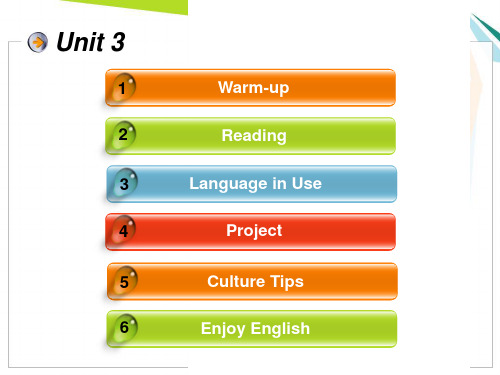
comfortable adj.
Reading Comprehension
Words & Expressions
Main idea of the passage
• The passage tells us the life retrospection of an old lady. It shows that the young are afraid of growing up and the old are dreaming of staying young. However, time is fair to everyone and passes by no matter what you think of.
pride when my first son was born.
BACK
• 昨天他因为失败而哭泣。 • He wept over his failure yesterday. • 她听到那个不幸的消息后哭了起来。 • She wept at the sad news.
Reading Comprehension
BACK
• sob one’s heart out 哭得死去活来
Reading Comprehension
Words & Expressions
3. comfort v.
to make someone feel less worried, unhappy, or upset 安慰 e.g. 1. Within hours of the news, Helen
